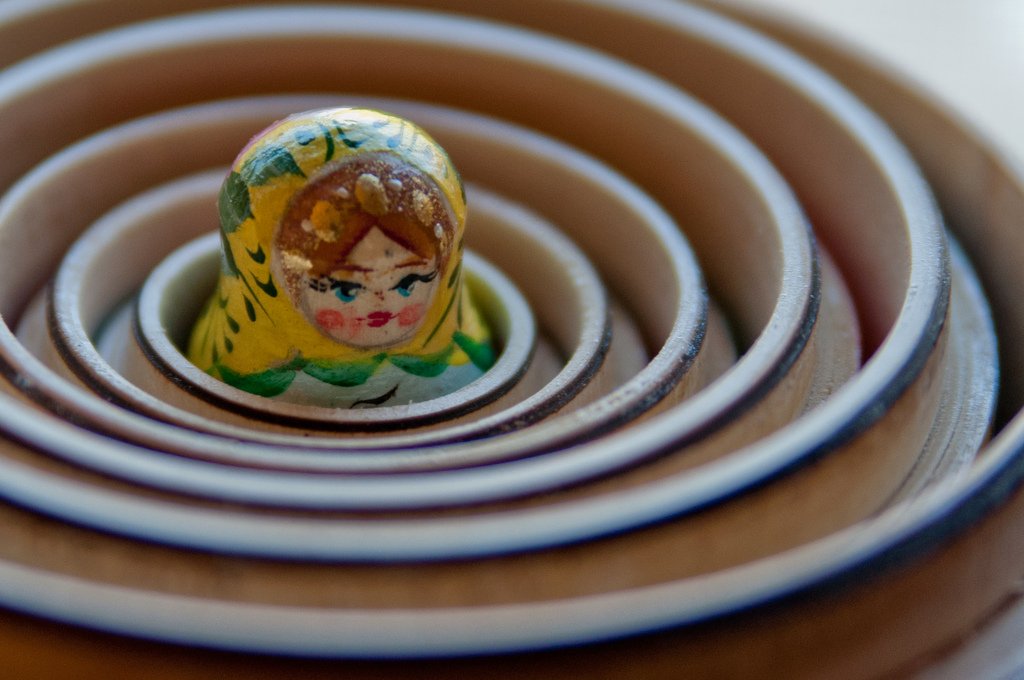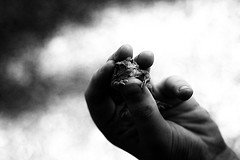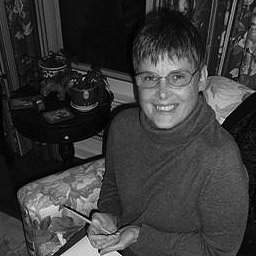
“Here we go,” Roberta croons, lifting her granddaughter from Bethy’s arms. Dora has been what Roberta would term ‘colicky’, but the pediatrician claims colic appears around three weeks, and Dora’s only ten days old.
“Thanks, Mom.” Bethy’s eyes are ringed with the gray stigmata of motherhood. Technically, she’s on maternity leave, due back at the law firm next month to defend a big Swiss client. Roberta thinks it would have been wise to delay having another child, but Bethy had always wanted three and was concerned about her age.
Across the table, Bethy’s husband begs the three-year-old twins to take just a bite of the burritos he tossed together for supper. One does, the other doesn’t. Both wriggle down from their booster seats and race to the media room where the TV has blared since dawn. Roberta can hear them clicking through the channels looking for Dora the Explorer (or “Dora Desplora” as her husband Danny says, mimicking the little guys).
Roberta suspects the new baby is named for this perky cartoon character. Dora is a slick little advertiser—the twins have Dora toothpaste and sneakers and now a Dora sister. They haven’t yet been told by a worldlier classmate that boys don’t have Dora, they have SpongeBob SquarePants.
“Turn it down!” calls Bethy’s husband. He gets up to start a pot of decaf as Bethy’s mobile phone peals the opening bars of An American in Paris. She slips it from its holster and bolts down the hall toward the master suite.
“Wait,” she says, her voice fading, “lemme grab a pencil.”
Rising slowly, to protect her back, Roberta walks a circuit through what she calls ‘the living room’ and everyone else calls ‘the great room’. It’s a path like her old boxer carved in the broadloom when he was trying to die. Poor thing, it had taken months. She wishes now she had let him outside, where he plainly wanted to be, even if it meant he’d freeze. Could that have been any worse than—
The house phone.
“Can somebody get that?” yells Bethy.
Her husband fumbles amid the table clutter and a sippy cup hits the floor spurting juice. “Where did you put the phone, Beth?” he shouts. Then, “Never mind, found it!” He tosses a handful of paper towels onto the floor and moves them around with his foot. “Dave?” he says, “Yeah, she’s on another call.”
Roberta can feel a headache coming on. She squeezes her eyebrows together, trying to ward it off, and presses Dora’s writhing little comma of a body against her ample shoulder, patting firmly, the way she once patted Bethy and her sisters—who did indeed have colic. All the babies had it back then. They bucked and screamed with an intensity you would not have believed. Maybe it was the cow’s milk, supposedly just as good as the breast. On those sleepless nights she often found herself blaming God, half expecting a lightning bolt.
It was satisfying, even comforting, to blame God for everything. Her Gen X daughters don’t go in for that kind of thing. These days, Barnes and Noble has whole aisles devoted to child-rearing—problems can be traced to allergies or genes or the school. But her girls suffer their own paranoia. Hardly surprising, Roberta thinks, when a couple of tantrums can land a toddler in anger management therapy at the insistence of his nursery school. And the over-protectiveness! Last spring Danny began to mention cars idling in driveways—those two new couples down the street, apparently waiting with their kids for the school bus—waiting in the car. Were there child molesters lurking behind every stop sign now, or were they shielding the kids from ordinary weather?
Last Easter, as Danny stood at the head of the table carving a ham, Roberta reminded their daughters she’d walked a mile by herself to first grade, through nursery fields where immigrant men weeded acres of young peonies. Some would look up and wave. Her father told her they were war refugees—Russians and Finns who’d been forced to leave their families behind—and that made Roberta feel sad. One afternoon, as she passed on the way from school, a grizzled-looking man rose from his weeding and approached her. Into her palm he tipped a tiny toad, closing the other over it.
“Take home,” he said, grinning, his accent so thick she almost didn’t understand. (And no, she insisted to Lisa, her eldest, she wasn’t afraid of the man—though the gaps in his smile reminded her of a jack o’lantern.)
She’d thanked him and continued on her way, not sure she wanted the creature. But later, when it escaped, she was heartbroken, missing the pulse of its throat against her hand, so strangely cool.

“An innocent encounter like that? It couldn’t happen today,” she told her girls. “Everyone is suspect.”
Pearl, the youngest at thirty-eight, had rolled her eyes. “Different times, Mom.”
All three daughters subscribed to the view that the world has become much more dangerous since the terrorist attacks four years ago. Roberta didn’t buy it. More dangerous than what—world war, the Inquisition, an open sewer in front of your hovel?
“The world’s always been dangerous,” she’d said, passing the sweet potatoes.
Roberta reenters the hall, switching Dora to her opposite shoulder. How she’d loved those walks to school, the freedom to dawdle and think her own thoughts. At Easter, her girls had laughed indulgently at her memories—they’d heard them before, of course. Bethy teased, “Wasn’t that two miles you walked to school, Mom, through three feet of snow?”
“Four,” said Roberta, laughing with them at the tired joke. But when Pearl added darkly, “What was your mother thinking?” the others had nodded, grim-faced.
Roberta peers into the bathroom, where the twins’ dad is herding them toward the tub. She won’t deny being overwhelmed by her daughters, their relentless opinions and demands. But what can you do, she thinks. They were born that way—talking over each other at the dinner table, drowning out their father’s bass. Like her own siblings, everyone speaking at once, her brothers hooting with laughter. She being the odd one, the observer. “My odd little duck”, her mother called her, a nickname shortened to Duck. Even now, at neighborhood gatherings or coffee hours at St. Brigid’s, it’s everyone wanting his say. She knows to make small talk, because otherwise people take offense. Too quiet, you get a reputation.
“C’mon guys, SpongeBob is wai-ting!” sings Bethy’s husband from the bathroom. “He’s doing the backstroke, he’s wai-ting!”
So maybe the twins have gotten the message about—
They hurtle past, dripping strawberry ice pops onto the ivory carpet and startling Dora awake. “Guys, please,” Roberta stage whispers, her head throbbing. Poor dears, they’re beyond exhausted, like their overworked parents. How does Bethy manage, she wonders. But she does. You really have to hand it to her.
“No dice,” says Bethy, returning from the master suite, the phone against her ear. “Absolutely not! If Yves can’t do better than that. . .
“Christ,” she says, a hand over the mouthpiece. “I may have to go to Zurich.”
Dora burps, spews curdled Enfamil onto her grandmother’s diapered shoulder. “Good girl,” murmurs Roberta. She wipes Dora’s lips, realigns the diaper on the cotton blouse reserved for walking babies. That newborn smell, faintly sweet like beeswax—
“Owww!” whines Roberta to nobody. She’s bumped her hip against Bethy’s dining room table. Of course there will be a big fat bruise.
“Ow and shit!” she says a little louder. And right then and there it occurs to her that maybe she wasn’t meant for any of this. Out of step with current childrearing, temperamentally unsuited from the start, a daydreamer who married right out of high school. . .
Inappropriate, thinks Roberta with a wrench of guilt. An inappropriate thought—what’s gotten into you? She nuzzles Dora’s head.
Guilt over what, though. She’s proud of her girls, educated, pursuing important careers. And hasn’t she loved them, isn’t she helping them launch their own families? She has. She is. But maybe she’s always been unsure.
Doubtful, especially during the no-sleep years when such an admission might have sent her to the garage and the gas pipe. No, the possibility of remaining childless has never seriously entered her mind till now.
She eases onto the couch, but sound erupts from the baby’s chest. “Sweeeetie, sweetie,” she whispers into Dora’s tiny ear and gets up again.
Might she have been satisfied with just Danny, had she been ‘barren’, as folks put it back then? They’d sit as they do now, chatting about his Chevy dealership or the news. Danny talks and she listens, of course—it’s always been that way, even the years she helped him with the bookkeeping. And really, that’s okay, except . . .
What about away alone, a book propped by her plate, reading into the night? An old craving, clearer with age. Her mind wanders to the church retreat last winter, a monastery on the Hudson. While the others found it challenging not to speak all day, she’d enjoyed reading, or doing yoga, or knitting by a window. As a girl she might have considered the convent, taken a vow of silence. How that would have pleased Sister Alice Edmund. Well, perhaps not the vow of silence—Edmund had said Roberta would make a fine teacher, a Dominican like herself. But Roberta knew she had no vocation, and Sister turned to more promising girls.
What if she hadn’t married at all, though?
Roberta pauses by the bathroom. Bethy is on the toilet seat, supervising the bath. “There is one bucket,” she says. “Shaaare, or I’m taking it away.”
Not marry Danny? Oh. But she loves him. It’s always been Danny. Still, this feels way too familiar for a newly-hatched idea. Away. It has form now: a cabin in the woods, a fireplace like the one in Bethy’s great room, just now edging into view. So maybe the thought has lurked at the back of her mind forever, like that birthmark behind her knee?
The next morning, the last of Roberta’s visit, the family assembles to greet their new, jet-lagged au pair. She’s a raw-boned girl, good-natured. Her English is bound to improve, thinks Roberta, as she prepares meatloaf for somebody to later put in the oven. The twins won’t touch it, but Bethy and her husband will. Maybe not the au pair, though. While helping her unpack, Roberta noticed a case of ramen noodles.
“We couldn’t have done this without you,” says Bethy warmly, her arm around her mother as they walk to the car. She lifts each twin to be kissed.
“Help Mommy, now, help your Daddy.”
Driving home through heavy rain, the first fall leaves flattening themselves against the windshield, Roberta wonders how Danny has fared. He’ll be wanting his supper, and there’s probably not much in the fridge. But he’s a tidy sort and there will likely be few chores—plants looking limp, that sort of thing. Oh, and making up the guest room for Pearl’s kids—the parents are off to the Caymans again.
After dinner Roberta waters the plants in the living room window. “Danny,” she says, surprising herself—she hadn’t intended to speak of this so soon. “I may need to get away for a while.”
Her back is to him, but she knows he has lowered his newspaper.
“Good idea,” he says, as she turns to face him. “What are you thinking—New York? I see they’ve done a remake of South Pacific.” He stretches his burly arms and goes back to the news.
Roberta takes a deep breath. “Actually,” she says, the word coming out in a strangled sigh, “I was thinking maybe alone.”
There, it’s out. She perches on the arm of the wing chair, her navy slacks stretched uncomfortably across her rear. How has she gained all this weight, how has she so completely lost track of herself?
Danny’s head reappears. He folds the newspaper and sets it aside, slipping his feet in and out of his loafers—that nervous habit. “What’s going on, Duck?” His dear forehead puckers, and she almost changes her mind.
“I might need to be off from things for a spell. I’m. . . a little tired.” Is that what she means?
“What do you mean, ‘off’?” says Danny.
“Well, that little cabin we rented once near Bolton’s Landing,” she continues, trying to maintain a reassuring smile. “I seem to remember it was winterized.”

From the instant the idea came to her, still fuzzy during the drive home from Bethy’s, she’d known this was going to be the hard part. That Danny wouldn’t accept that nothing is wrong between them, might even ask if there’s someone else—the farthest thing from her mind.
“Pearl’s kids,” says Danny. “Aren’t you watching them next week?”
“After they go home.”
She loves him. She tells him so, but it isn’t quite sinking in the way she’d planned. Even now she understands he’ll think she’s gone for good. They all will. Maybe she should have waited.
“What are you going to do up there? I can’t picture it.”
Read? Hike in the forest? He doesn’t get it, he can’t. But she knows she will continue to recall his hurt confusion, that it will trouble her. And she’ll make herself do it often, to remember the cost. By comparison the rest should prove easy. Hauling firewood, shoveling snow, periodic trips over to Bolton’s Landing for groceries and mail.
Already she’s started to pay.

Share this post with your friends.


This is entirely emotionally intriguing. Juditha packs a whole life into a few pages, successfully! I love it.